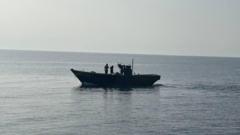South Korea has recently repatriated six North Koreans who unintentionally crossed into its waters earlier this year, as confirmed by the Ministry of Unification. These individuals had consistently expressed their desire to return to North Korea. Among them, two North Koreans had drifted south in March and remained for four months—marking the longest period recorded for non-defectors. The other four, identified as sailors, found themselves across a disputed maritime boundary in May.
This repatriation marks a significant event under President Lee Jae-myung's administration, which had campaigned on a platform aimed at improving inter-Korean relations. Despite efforts from both pre- and post-election periods to arrange the return, communication between the two Koreas has been challenging due to heightened tensions and North Korea's decision to sever inter-Korean contact lines as of April 2023. Observers noted that, during the handover, North Korean patrol and fishing vessels were present, suggesting some level of coordination behind the scenes.
Historically, North Koreans who accidentally enter South Korean waters are often returned through cooperation between the two nations, typically via land borders. Current communication avenues are limited, primarily involving the U.S.-led United Nations Command and media channels. Following the repatriation, experts surmised that the six individuals would undergo extensive interrogation upon their return to assess if they had gathered any sensitive information during their time in the South.
Criticism arose from North Korean defectors and activists who argued that the returning individuals missed an opportunity to learn about South Korean society. Activist Lee Min-bok, a former defector, lamented that engagement with defectors could have beneficially influenced their perspectives on life in the North, especially given the risks of punitive measures from the regime after experiencing life outside its confines.
The Lee Jae-myung administration, while aiming for renewed dialogue with Pyongyang and a détente in relations—evidenced by halting military propaganda broadcasts—faces skepticism. Analysts suggest North Korea's strong alignment with Russia diminishes its incentive to engage with the South. With public sentiment in South Korea appearing indifferent to reconciliation efforts, signs of improved communication between the Koreas remain sparse.




















